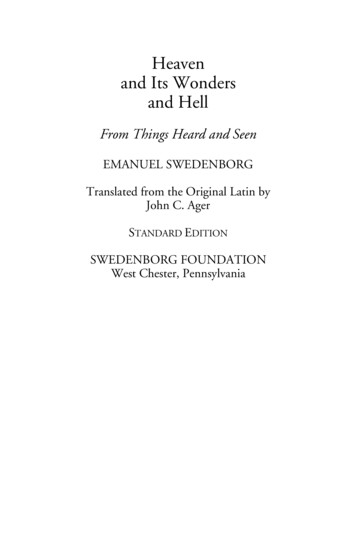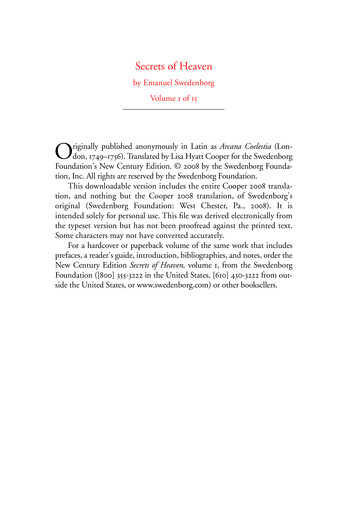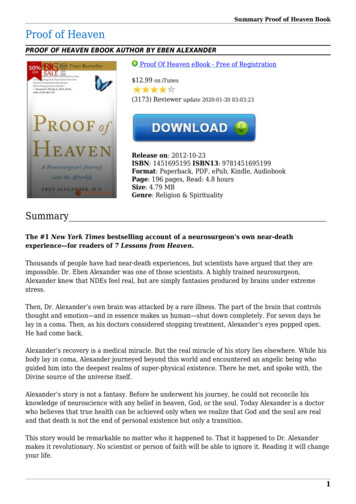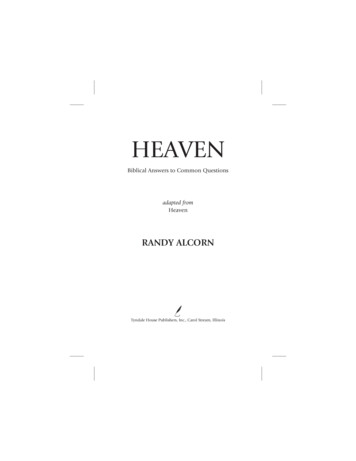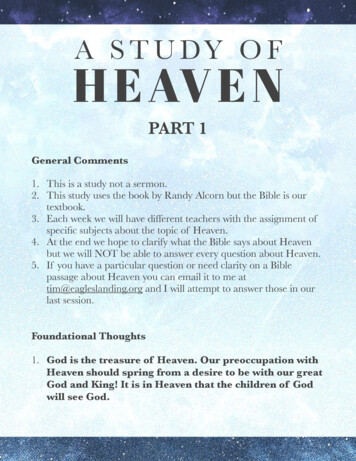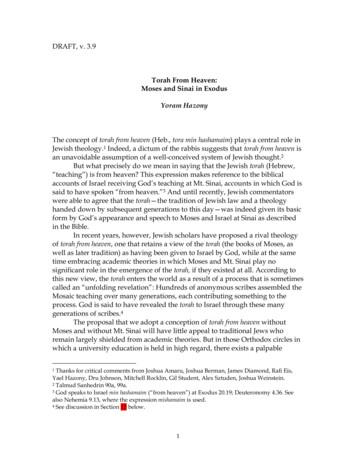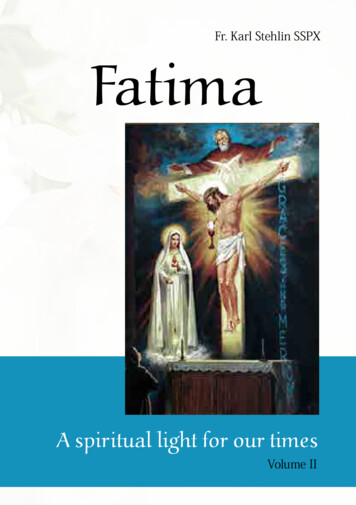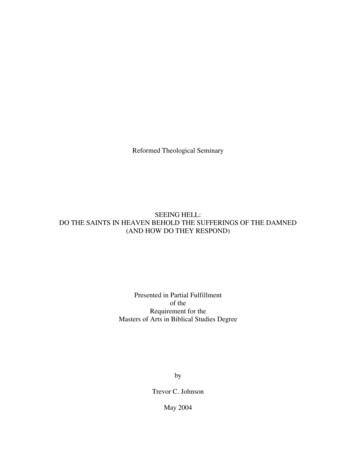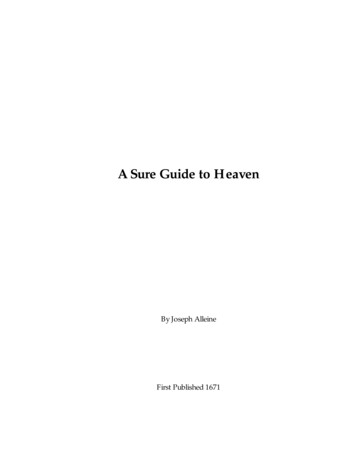
Transcription
A Sure Guide to HeavenBy Joseph AlleineFirst Published 1671
Table of ContentsBiographical introduction . 3Introduction. 7Mistakes about conversion. 9The nature of conversion . 12The necessity of conversion. 23The marks of the unconverted . 31The miseries of the unconverted. 36Directions to the unconverted. 44The motives to conversion. 57Conclusion. 622
Biographical IntroductionJoseph Alleine was born into a Puritan family at Devizes, in Wiltshire, and baptized on April 8th,1634. England was then in the throes of the stirring events that were soon to lead to the Civil War, andbefore Alleine was ten years old the Market Square, where his home stood, echoed with the crash of cannonand the peal of musket as Royalist put Roundhead to flight at the battle of Roundway (July 1643). Two yearslater the tables were turned and Cromwell himself saw to it that the blue banner of Parliament was raised aloftover the old castle that stood opposite the home of Alleine's childhood. The family circle was also notwithout its trials. His father, though a clothier of good standing, suffered some of the economic misfortunesof war; and to their grief, Joseph's eldest brother, Edward, already in the ministry, died in 1645.That same year saw Alleine 'setting forth in the Christian race' and imploring his father that he mightbe educated to 'succeed his brother in the work of the ministry'. Thus, in April 1649 we find him going up toOxford to sit at the feet of such divines as John Owen and Thomas Goodwin. In November 1651 he movedfrom Lincoln to Corpus Christi College - the latter, under the presidency of the saintly Dr Edward Staunton,being a more thoroughgoing Puritan seminary. Here he took his B.A. on July 6th 1653, became a tutor andsubsequently chaplain to the College. Doubtless it was partly due to Alleine's influence that Henry Jesseycould write in 1660: '1 think there was scarce such a place in the world as Corpus Christi, where such amultitude held forth the power of godliness, and purity of God's worship. Even an Eden it was, but now abarren wilderness.'Alleine's years at Oxford were characterized by piety and diligent study. His warm disposition foundhim many friends, but if their visits interrupted his studying time 'he had no leisure to let them in, saying, "Itis better that they should wonder at my rudeness than that I should lose my time; for only a few will takenotice of the rudeness, but many may feel my loss of time."' As a chaplain he laboured to evangelize countryvillages around Oxford and also preached to the prisoners in the gaol every fortnight. Such was his trainingfor his future ministry. Not yet twenty-one, he had already learned to be 'infinitely and insatiably greedy forthe conversion of souls and to this end he poured out his very heart in prayer and in preaching'.It is no wonder that a worthy Puritan divine, George Newton (1602-1681), minister of St MaryMagdalen, Taunton, called Alleine to be his assistant in 1655. Taunton, a wool manufacturing town with apopulation of perhaps some 20,000, was a Puritan stronghold in the West Country. The spirit of the townhad been clearly displayed ten years earlier when, with heroic steadfastness, it had withstood more than onedesperate Royalist siege - even when half the streets had been burned down by a storm of mortars and manyof the inhabitants had died of starvation! It was here, amidst the hills, meadows and orchards of Somerset,that Alleine was to spend his short but unforgettable ministry.Immediately following the commencement of his work at Taunton, Alleine was married on October4th, 1655, to his cousin Theodosia Alleine, a woman of singular spirituality, who left a moving account of herhusband's ministry. The only 'fault' for which she chided her husband was that he did not spend more timewith her, to which he would reply, 'Ah, my dear, I know thy soul is safe; but how many that are perishinghave I to look after? O that I could do more for them!' Alleine's whole life was an illustration of his saying,'Give me a Christian that counts his time more precious than gold.' When the week began he would say,'Another week is now before us, let us spend this week for God', and each morning, 'Now let us live this oneday well!' 'All the time of his health', writes his wife, 'he did rise constantly at or before four o'clock, and onthe Sabbath sooner, if he did wake; he would be much troubled if he heard any smiths, or shoemakers, orsuch tradesmen, at work at their trades before he was in his duties with God; saying to me after, "O how thisnoise shames me! doth not my master deserve more than theirs?" From four till eight he spent in prayer, holycontemplation, and singing of psalms, which he much delighted in, and did daily practice alone, as well as inhis family.'Together this devoted pair laboured for souls. Theodosia Alleine kept a school for children in herhome, while her husband spent five afternoons every week following up the urgent calls to the unconvertedwhich sounded forth Sunday by Sunday from beneath the stately tower of Mary Magdalen. He kept acatalogue of the names of the inhabitants of each street and saw that all were visited and catechized. This3
resulted in a numerous ingathering of souls.1 'His supplications and his exhortations', said George Newton,'many times were so affectionate, so full of holy zeal, life, and vigour, that they quite overcame his hearers; hemelted them and sometimes dissolved the hardest hearts.' It is clear that even in an age when powerfulpreaching and successful evangelism were comparatively common, Alleine's ministry was outstanding in theeyes of his brethren. 'Few ages have produced more eminent preachers than Mr. Joseph Alleine',declared that apostolic North Country Puritan, Oliver Heywood. And Baxter speaks of his’ greatministerial skilfulness in the public explication and application of the Scriptures - so melting, soconvincing, so powerful'.A day of grace was nearing its sunset when Alleine entered upon his ministry. Within three yearsCromwell was dead. Two years more and the bells at Taunton rang merrily to welcome the homecoming ofCharles II and the restoration of monarchy (1660). But the happiness in Puritan hearts was short lived. For theera when, as Philip Henry said, 'a face of godliness was upon the nation' was over and in 1662, by the infamousAct of Uniformity, 2,000 of the best ministers England ever had were cast out of their pulpits. Among theeighty-five or so ministers who suffered in this way in Somerset we find, as we might well expect, the names ofGeorge Newton and Joseph Alleine. But, though debarred from his pulpit, Alleine refused to be silenced; indeedhis wife tells us how, 'laying aside all other studies because he accounted his time would be but short', heincreased his preaching activity: 'I know that he hath preached fourteen times in eight days, and ten often, andsix and seven ordinarily in these months.'At length after surviving many threats Alleine received a summons on May 26th 1663; the followingnight he appointed to meet his people 'about one or two o'clock in the morning, to which they shewed theirreadiness: there was of young and old many hundreds; he preached and prayed with them about three hours'.The next day he was thrown into prison at Ilchester. After a year he was released, but only to be confronted bythe rigours of the Five Mile Act and the Conventicle Act. Though now declining in health, he neverthelessresumed preaching in secret until July 10th 1666. On that evening whilst he was preaching on Psalm cxlvii 20 toa gathering in a private house, the doors were battered open and he was again taken to prison. Once more hewas released, and with undiminished spiritual energy he considered what he might yet do to further the Gospelof Christ. 'Now we have one day more', he would say to his wife as he rose in the morning, 'here is one more forGod, now let us live well this day, work hard for our souls, lay up much treasure in heaven this day, for we havebut a few to live.' His wife tells us how, with true Puritan spirit, his thoughts turned to the possibility ofmissionary work in Wales or even in China. Never did the evangel of Jesus Christ burn more fervently in anyEnglish heart! But Alleine's work was done, for his physical constitution never recovered from the hardships ofhis confinements and his body was sinking fast. On November 17th 1668 at the age of thirty-four, God tookhim away from the evils yet to come, and aged George Newton stood by as his body was laid to rest in thechancel of the church which had once resounded with the 'alarm' of his calls to the unconverted.This book embodies the substance of Alleine's message and in so doing provides a true model ofPuritan evangelism. Phraseology must differ from age to age and gifts from man to man, but here, we have nohesitation in saying, are the principles which must be present in any true presentation of the Gospel. More thanone great evangelist has had his views moulded by the following pages. George Whitefield, while still a studentat Oxford, tells us in his Journals how Alleine's Alarm 'much benefited' him. Charles Haddon Spurgeon recordshow, when he was a child, his mother would often read a piece of Alleine's Alarm to them as they sat round thefire on a Sunday evening, and when brought under conviction of sin it was to this old book he turned. 'Iremember', he writes, 'when I used to awake in the morning, the first thing I took up was Alleine's Alarm, orBaxter's Call to the Unconverted. Oh those books, those books! I read and devoured them. . . .' With his heart thusburning with the fire of Puritan divinity, Spurgeon was prepared to follow in the steps of Alleine and Whitefield.Countless editions of this book have been issued since it first saw the light in 1671. Dr Calamy wroteconcerning it in 1702: 'Multitudes will have cause for ever to be thankful for it. No book in the English tongue(the Bible only excepted) can equal it for the number that hath been dispersed; there have been twenty thousandsold under the title of the "Call", or "Alarm", and fifty thousand of the same under the title of the "Sure Guide1The Lord was pleased to bless us exceedingly in our endeavours', Theodosia Alleine wrote, 'so that many wereconverted in a few years, that were before strangers to God.' Joseph Allelne, by Charles Stanford, 1861, p. 101.4
to Heaven", thirty thousand of which were sold at one impression.' As a remarkable illustration of the spiritualinfluence of this work we may mention one example. Towards the end of the eighteenth century the ministerof a Highland congregation, a man more eminent for scholarship than evangelical fervour, was approached bya Society to translate the Alarm' into Gaelic. The book was thus passed into his hands and finding it suitablematerial for the pulpit he commenced to repeat the substance of its successive chapters to his congregation.The result, it is said, was a widespread awakening, which long prevailed in the district of Nether Lorn'.With the prayer that the substance of this book may again be sounded forth throughout our land andacross the seas, we commend this book to the blessing of Him whose word is 'quick and powerful, andsharper than any two-edged sword'. 'All flesh is as grass, and all the glory of man as the flower of grass. Thegrass withereth, and the flower thereof falleth away: But the word of the Lord endureth for ever. And this isthe word which by the gospel is preached unto you' (1 Pet i 24-25).1 August 1959IAIN MURRAY5
A Sure Guide To Heaven6
IntroductionAn earnest invitation to sinners to turn to GodDearly Beloved, I gladly acknowledge myself a debtor to you, and am concerned, as I would befound a good steward of the household of God, to give to every one his portion. But the physician ismost concerned for those patients whose case is most doubtful and hazardous; and the father's pity isespecially turned towards his dying child. So unconverted souls call for earnest compassion andprompt diligence to pluck them as brands from the burning (Jude 23). Therefore it is to them I shallfirst apply myself in these pages.But from where shall I fetch my argument? With what shall I win them? O that I could tell! Iwould write to them in tears, I would weep out every argument, I would empty my veins for ink, Iwould petition them on my knees. O how thankful should I be if they would be prevailed with torepent and turn.How long have I laboured for you! How often would I have gathered you! This is what I haveprayed for and studied for these many years, that I might bring you to God. O that I might now do it!Will you yet be entreated? But, O Lord, how insufficient I am for this work. Alas, with what shall I pierce the scales of Leviathan, or make theheart feel that is hard as the nether millstone? Shall I go and speak to the grave, and expect the dead will obey me and comeforth? Shall I make an oration to the rocks, or declaim to the mountains, and think to move them with arguments? Shall I makethe blind to see? From the beginning of the world was it not heard that a man opened the eyes of the blind (Jn ix 32). But, OLord, Thou canst pierce the heart of the sinner. I can only draw the bow at a venture, but do Thou direct the arrow between thejoints of the harness. Slay the sin, and save the soul of the sinner that casts his eyes on these pages.'There is no entering into heaven but by the strait passage of the second birth; without holinessyou shall never see God (Heb xii 14). Therefore give yourselves unto the Lord now. Set yourselves toseek Him now. Set up the Lord Jesus in your hearts, and set Him up in your houses. Kiss the Son (Ps ii12) and embrace the tenders of mercy; touch His sceptre and live; for why will ye die? I do not beg formyself, but would have you happy: this is the prize I run for. My soul's desire and prayer for you is, thatyou may be saved (Rom x 1).I beseech you to permit. a friendly plainness and freedom with you in your deepest concern. Iam not playing the orator to make a learned speech to you, nor dressing the dish with eloquence in orderto please you. These lines are upon a weighty errand indeed - to convince, and convert, and save you. Iam not baiting my hook with rhetoric, nor fishing for your applause, but for your souls. My work is notto please you, but to save you; nor is my business with your fancies, but with your hearts. If I have notyour hearts, I have nothing. If I were to please your ears, I would sing another song. If I were to preachmyself, I would steer another course. I could then tell you a smoother tale; I would make pillows for youand speak peace, for how can Ahab love this Micaiah, that always prophesies evil concerning him? (1Kgs xxii 8). But how much better are the wounds of a friend, than the fair speeches of the harlot, whoflatters with her lips, till the dart strike through the liver? (Prov vii 21-23 and vi 26). If I were to quiet acrying infant, I might sing him into a happier mood, or rock him asleep; but when the child is fallen intothe fire, the parent takes another course; he will not try to still him with a song or trifle. I know, if wesucceed not with you, you are lost; if we cannot get your consent to arise and come away, you will perishfor ever. No conversion - no salvation! I must get your good-will, or leave you miserable.But here the difficulty of my work again occurs to me. 'O Lord, choose my stones out of the brook (1 Samxvii 40, 4S). I come in the name of the Lord of hosts, the God of the armies of Israel. I come forth, like the stripling Davidagainst Goliath, to wrestle, not with flesh and blood, but with principalities and powers, and rulers of the darkness of this world(Eph vi 12). This day let the Lord smite the Philistines, spoil the strong man of his armour, and give me the captives out of hishand. Lord, choose my words, choose my weapons for me; and when I put my hand into the bag, and take out a stone and slingit, do Thou carry it to the mark, and make it sink, not into the forehead, but into the heart of the unconverted sinner, and smitehim to the ground like Saul of Tarsus (Acts ix 4).'Some of you do not know what I mean by conversion, and in vain shall I attempt to persuadeyou to that which you do not understand. Therefore for your sakes 1 will show what conversion is.7
Others cherish secret hopes of mercy, though they continue as they are. For them I must showthe necessity of conversion.Others are likely to harden themselves with a vain conceit that they are converted already. Tothem I must show the marks of the unconverted.Others, because they feel no harm, fear none, and so sleep as upon the top of a mast. To them Ishall show the misery of the unconverted.Others sit still, because they do not see the way of escape. To them I shall show the means ofconversion.And finally, for the quickening of all, I shall close with the motives to conversion.8
Mistakes about conversionThe devil has made many counterfeits of conversion, and cheats one with this, and another with that.He has such craft and artifice in his mystery of deceits that, if it were possible, he would deceive the veryelect. Now, that I may cure the ruinous mistake of some who think they are converted when they are not, aswell as remove the troubles and fears of others who think they are not converted when they are, I shall showyou the nature of conversion, both what it is not, and what it is. We will begin with the negative.Conversion is not the taking upon us the profession of Christianity. Christianity is more than aname. If we will hear Paul, it does not lie in word, but in power (1 Cor 1v 20). If to cease to be Jews andpagans, and to put on the Christian profession, had been true conversion - as this is all that some would haveto be understood by it - who better Christians than they of Sardis and Laodicea? These were all Christians byprofession, and had a name to live only; but because they had a name, they are condemned by Christ, andthreatened to be rejected (Rev iii 14-16). Are there not many that name the name of the Lord Jesus, that donot depart from iniquity (2 Tim ii 19), and profess they know God, but in works deny Him? (Titus i 16). Andwill God receive these for true converts? What! converts from sin, when they still live in sin? It is a visiblecontradiction. Surely, if the lamp of profession would have served the turn, the foolish virgins had never beenshut out (Mt xxv 12). We find not only professing Christians, but preachers of Christ, and wonder-workers,rejected, because they are evil-workers (Mt vii 22-23).Conversion is not putting on the badge of Christ in baptism. Ananias and Sapphira, and SimonMagus were baptized as well as the rest. How many make a mistake here, deceiving and being deceived;dreaming that effectual grace is necessarily tied to the external administration of baptism, so that everybaptized person is regenerated, not only sacramentally, but really and properly. Hence men fancy that becausethey were regenerated when baptized, they need no farther work. But if this were so, then all that have beenbaptized must necessarily be saved, because the promise of pardon and salvation is made to conversion andregeneration (Acts iii 19; Mt xix 28). And indeed, were conversion and baptism the same, then men would dowell to carry but a certificate of their baptism when they died, and upon sight of this there were no doubt oftheir admission into heaven.In short, if there is nothing more to conversion, or regeneration, than to be baptized, this will flydirectly in the face of that Scripture, Mt vii 13-14, as well as multitudes of others. If this is true, we shall nomore say, 'Strait is the gate, and narrow is the way' for if all that are baptized are saved, the door is exceedingwide, and we shall henceforth say, 'Wide is the gate, and broad is the way that leadeth unto life.' If this is true,thousands may go in abreast; and we will no more teach that the righteous are scarcely saved, or that there isneed of such a stir in taking the kingdom of heaven by violence, and striving to enter in (1 Pet iv 18; Mt xi 12;Lk xiii 24). Surely, if the way be so easy as many suppose, that little more is necessary than to be baptized andto cry out, 'Lord, have mercy', we need not put ourselves to such seeking, and knocking, and wrestling, as theWord requires in order to salvation. Again, if this is true, we shall no more say, 'Few there be that find it'; we willrather say, 'Few there be that miss it.' We shall no more say, that of the many that are called, only few arechosen' (Mt xxii 14), and that even of the professing Israel but a remnant shall be saved (Rom ix 27). If thisdoctrine is true, we shall no more say with the disciples, 'Who then shall be saved?' but rather, 'Who then shallnot be saved' Then, if a man be baptized, though he is a fornicator, or a railer or covetous, or a drunkard, yethe shall inherit the kingdom of God! (1 Cor v 11 and vi 9, 10).But some will reply, 'Such as these, though they receive regenerating grace in baptism, are since fallenaway, and must be renewed again, or else they cannot be saved.'I answer, 1. There is an infallible connection between regenertion and salvation, as we have alreadyshown. 2. Then man must be again born again, which carries a great deal of absurdity in its face. We might aswell expect men to be twice born in nature as twice born in grace! But, 3, and above all, this grants the thing Icontend for, that whatever men do or pretend to receive in baptism, if they are found afterwards to be grosslyignorant, or profane, or formal, without the power of godliness they 'must be born again' (Jn iii 7) or else beshut out of the kingdom of God. So then they must have more to plead for themselves than their baptismalregeneration.9
Well, in this you see all are agreed, that, be it more or less that is received in baptism, if men areevidently unsanctified, the must be renewed by a thorough and powerful change, or else they cannot escapethe damnation of hell. 'Be not deceived; God is not mocked.' Whether it be your baptism, or whatever else youpretend, I tell you from the living God, that if any of you be prayerless person, or a scoffer, or a lover of evilcompany (Prov xiii 20), in a word, if you are not a holy, strict, and self-denying Christian, you cannot be saved(Heb xii 14; Mt xv 14)Conversion does not lie in moral righteousness. This does not exceed the righteousness of theScribes and Pharisees, and therefore cannot bring us to the kingdom of God (Mt v 20). Paul, whileunconverted, touching the righteousness which is the law was blameless (Phil iii 6). The Pharisee could say, 'Iam no extortioner, adulterer, unjust', etc. (Lk xviii 11). You must have something more than all this to show,or else, however you may justify yourself, God will condemn you. I do not condemn morality, but I warn younot to rest in it. Piety includes morality, as Christianity does humanity, and as grace does reason; but we mustnot divide the tables.Conversion does not consist in an external conformity to the rules of piety. It is manifest thatmen may have a form of godliness, without the power (2 Tim iii 5). Men may pray long (Mt xxiii 14), and fastoften (Lk xviii 12), and hear gladly (Mk vi 20), and be very forward in the service of God, though costly andexpensive (Is i 11), and yet be strangers to conversion. They must have more to plead for themselves than thatthey go to church, give alms, and make use of prayer, to prove themselves sound converts. There is no outwardservice but a hypocrite may do it, even to the giving of all his goods to feed the poor, and his body to be burned(1 Cor xiii 3).Conversion is not the mere chaining up of corruption by education, human laws or the force ofaffliction. It is too common and easy to mistake education for grace; but if this were enough, who a better manthan Jehoash? While Jehoiada, his uncle, lived, he was very forward in God's service, and calls upon him torepair the house of the Lord (2 Kgs xii 2, 7). But here was nothing more than good education all this while; forwhen his good tutor was taken away he appears to have been but a wolf chained up, and falls into idolatry.In short, conversion does not consist in illumination or conviction or in a superficial change orpartial reformation. An apostate may be an enlightened man (Heb vi 4), and a Felix tremble under conviction(Acts xxiv 25), and a Herod do many things (Mk of 20). It is one thing to have sin alarmed only by convictions,and another to have it crucified by converting grace. Many, because they have been troubled in conscience fortheir sins, think well of their case, miserably mistaking conviction for conversion. With these, Cain might havepassed for a convert, who ran up and down the world like a man distracted, under the rage of a guiltyconscience, till he stifled it with building and business. Others think that because they have given up theirriotous ways, and are broken off from evil company or some particular lust, and are reduced to sobriety andcivility, they are now real converts. They forget that there is a vast difference between being sanctified andcivilized. They forget that many seek to enter into the kingdom of heaven, and are not far from it, and arrive tothe almost of Christianity, and yet fall short at last. While conscience holds the whip over them, many will pray,hear, read, and forbear their delightful sins; but no sooner is the lion asleep than they are at their sins again. Whomore religious than the Jews when God's hand was upon them? Yet no sooner was the affliction over, than theyforgot God. You may have forsaken a troublesome sin, and have escaped the gross pollutions of the world, andyet in all this not have changed your carnal nature.You may take a crude mass of lead and mould it into the more comely proportion of a plant, and theninto the shape of an animal, and then into the form and features of a man; but all the time it is still lead. So aman may pass through various transmutations, from ignorance to knowledge, from profanity to civility, then toa form of religion, and all this time he is still carnal and unregenerate, his nature remains unchanged.Hear then, O sinners, hear as you would live. Why should you willfully deceive yourselves, or build yourhopes upon the sand? I know that he will find hard work that goes to pluck away your hopes. It cannot but beunpleasant to you, and truly it is not pleasing to me. I set about it as a surgeon when about to cut off a mortifiedlimb from his beloved friend, which of necessity he must do, though with an aching heart. But understand me,beloved, I am only taking down the ruinous house, which otherwise will speedily fall of itself and bury you inthe ruins, that I may build it fair, strong, and firm for ever. The hope of the wicked shall perish (Prov xi 7). Andhad you not better, O sinner, let the Word convince you now in time, and let go your false and self-deluding10
hopes, than have death open your eyes too late, and find yourself in hell before you are aware? I should be afalse and faithless shepherd if I should not tell you, that you who have built your hopes upon no bettergrounds than these before mentioned, are yet in your sins. Let conscience speak. What have you to pleadfor yourselves? Is it that you wear Christ's livery; that you bear His name; that you are a member of thevisible church; that you have knowledge in the points of religion, are civilized, perform religious duties,are just in your dealings, have been troubled in conscience for your sins? I tell you from the Lord, thesepleas will never be accepted at God's bar. All this, though good in itself, will not prove you converted,and so will not suffice to your salvation. O look to it, and resolve to turn speedily and entirely. Studyyour own hearts; do not rest till God has made thorough work with you; for you must be other men, orelse you are lost men.But if these persons come short of conversion, what shall I say of the profane person? It may behe will scarcely cast his eyes on, or lend his ear to this discourse; but if there be any such reading, orwithin hearing, he must know from the Lord that made him, that he is far from the kingdom of God.May a man keep company with the wise virgins, and yet be shut out; and shall not a companion of foolsmuch more be destroyed? May a man be true in his dealings, and yet not be justified before God? Whatthen will become of you, O wretched man, whose conscience tells you that you are false in your tradeand false to your word? If men may be enlightened and brought to the external performance of holyduties, and yet go down to perdition for resting in them and sitting down on this side of conversion;what will become of you, O miserable families that live without God in the world? What will become ofyou, O wretched sinners, with whom God is scarcely in all your thoughts; that are so ignorant that youcannot pray, or so careless that you will not? O repent and
Joseph Alleine was born into a Puritan family at Devizes, in Wiltshire, and baptized on April 8th, 1634. England was then in the throes of the stirring events that were soon to lead to the Civil War, and . being a more thoroughgoing Puritan seminary. Here he took his B.A. on July 6th 1653, became a tutor and subsequently chaplain to the .
